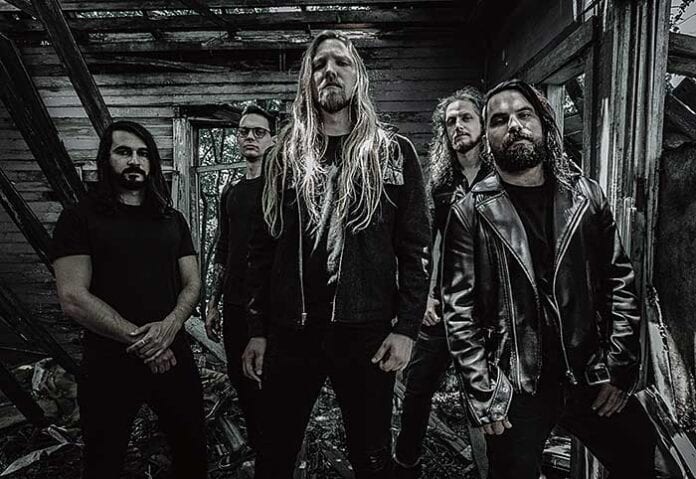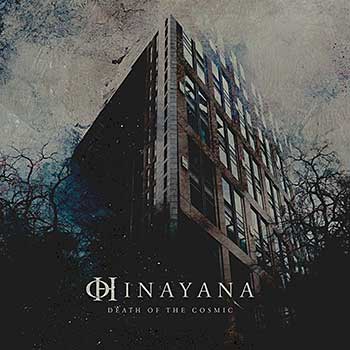
INTERVIEW WITH CASEY HURD BY JOE DALY
PHOTOGRAPH BY JACKIE SCHUTZA
While 2020 continues to administer one unrelenting beatdown after another, it has also emerged as an uncommonly strong year for new metal releases. From venerable titans like Lamb of God, Paradise Lost, and Deftones to insurgent riff merchants like Code Orange and Imperial Triumphant, the year has delivered exhilarating new music in virtually every metal subgenre. Closing out the summer, Austin, Texas based Hinayana drops their Napalm Records debut and hotly anticipated EP, Death of the Cosmic—four driving, blood pumping tracks that squarely establish that the Nordic countries no longer claim an icy monopoly over authentic melodic death metal.
Hinayana’s 2018 debut, Order Divine, drew no shortage of inspiration from bands like Wolfheart, Swallow the Sun, and Insomnium, with ambitious songwriting and soulful fretwork that raised more than a few eyebrows in the underground. With Death of the Cosmic, the band has taken a monstrous step forward in virtually all areas—songwriting, musicianship, and production—and the release portends greats things ahead for the Texans.
We caught up with founder/guitarist/vocalist Casey Hurd to discuss the new EP and the wild ride that is 2020.
2020 has been a brutal year for bands. How has it been for Hinayana?
We had just got signed to Napalm Records, which was a huge deal for us. We had some gigs planned and we had just hooked up with a touring agency when the pandemic put all of that on hold. So, we’re just hanging in there, waiting to see how things go, and keeping our fingers crossed for next year. In the meantime, there was a lot of stuff to be done with the new label and getting the EP release prepared. It’s been exciting to see the reactions to the singles we’ve released. We’ve been sitting on this for a long time—at least a year now—and it’s exciting to finally get to show it to people.
You started in 2014 as a one-man project. How has the band evolved since then?
I grew up in the country here in Texas, and there weren’t a whole lot of metalheads. I wasn’t living in Austin at the time. I lived out in the country and I just thought, “Fuck it, I’m going to make something myself. I’m going to make the music that I want to hear.” I didn’t even expect anyone to like it, to be honest. If anyone likes it, fine, but then people wanted to hear more. They started downloading it and requesting physical copies, and I realized that I had some work to do! Then when I saw people’s reaction, I realized,“Shit, I’m going to have to do this stuff live!” (laughs) I decided to meet up with some musicians, and the process took a while to nail down, but we’ve finally got a good group now and we’re really happy to be working together.
Wait, you didn’t think people would like it? Why not?
Honestly, I wasn’t confident in my own writing. It’s a little doomy and gloomy and it’s not super technical—I’m not some super shredder—so maybe people weren’t going to find this exciting. I didn’t realize how big the market was for music like this.
“I WANTED TO EVOLVE OUR SOUND. I WANTED TO MAKE SOMETHING A LITTLE MORE UNIQUE TO US.”
Your debut, Order Divine, certainly attracted some attention. In hindsight, what’s your take on that album?
I think we did the best we could at the time with the resources we had. There was really nothing else that we could have done back then to make it better. We were working on limited time and a limited budget for studio time. We just wanted to get stuff out there and not leave everything sitting so long without releasing something. It was really cool seeing people respond to that. Back then it was mostly just me and our drummer [Daniel Vieira] and it was cool collaborating and working on something with someone else. I’d done the first demo all by myself, so it was really cool collaborating.
What was your goal for the EP?
I wanted to evolve our sound. I wanted to make something a little more unique to us. When I was writing, we agreed that it would be a steppingstone between Order Divine and the next album. In one way it is, but on the other hand, it’s not. It’s become its own thing. We feel like it’s much better than the previous material, and we’re really proud of it. It’s become much more than just some EP that we’re throwing out there.
When you talk about evolving the sound, where will we hear the differences between Death of the Cosmic and Order Divine?
First of all, we really focused on the production on the EP. It’s definitely better than on Order Divine. Secondly, we wanted to make the songwriting more dynamic. It needed more range than what we’d been doing within the songs. Also, I wanted to improve my vocal performance and I think you’ll hear that the vocals are a lot stronger on the EP than on the album. We paid a lot of attention to detail on the EP as well. There’s more dynamics and atmospherics in the background than on Order Divine. We also put more money into the EP, which always helps (laughs).
You’re from Texas but listening to the EP, it feels like it could have easily come from the woods of Finland or Sweden. What were some of your influences?
That’s correct. The music coming from Finland, Sweden, and Norway and all of that European stuff is where my heart is with this shit. As far as the EP goes, if you ask my drummer, I think he’d tell you that a lot of his parts were influenced by the past few Katatonia albums. There’s some fantastic drumming on those albums, and he was very inspired by that. Personally for me, the whole idea of doing it as a one-man band came from Tuomas Saukkonen of Wolfheart. His old project, Black Sun Aeon, inspired the shit out of me. He did a lot of multi-instrumental shit on that, and I realized that I didn’t have to have a full band to start writing and creating music. And a lot of bands from that area inspired me with the combination of melodic and sorrowful.

The EP has four tracks with “Yet Here I Wait Forever” serving as almost a transition into the closer, “Pitch Black Noise.” Can you tell us about that final track?
That’s actually the second song that I ever wrote for the band. We ended up having a blast playing that song live, so we thought that we’d better do this song justice in terms of production, spicing up the rhythm parts, the vocal performances, etc. We wanted to really build on the initial demo. So, it was a balance between some of the stuff that I was writing on Order Divine and the newer stuff that I was writing for the EP. I like it as a closer because it’s straightforward. It’s got a really straightforward groove, it’s got big chords, a big chorus, and some really hard-hitting moments.
Cold Conception features a guest appearance from the late Nature Ganganbaigal of Tengger Cavalry. How did that collaboration occur?
Nature lived in Austin before he passed away. He was friends with a lot of people that we were also friends with, so we started talking online. When we met up with him, he was very encouraging about our music and the stuff that we’d made. He wasn’t bragging about any of the stuff that he’d done, he was just very encouraging. We had the idea of maybe doing something together. I’d already known Tengger Cavalry. I’d heard their stuff years before meeting him and I’d fallen in love with that horse head fiddle that he plays on those tracks. I asked him how he’d feel about collaborating, and he was excited about it, which was cool.
“THE EP ITSELF IS ABOUT HOW WE, AS MANKIND, ARE LEAVING BEHIND THE HUMAN SPIRIT”
What was it like to play with him?
I had some ideas for “Cold Conception” where it could sound really exotic. It had some really heavy riffs, and I thought it might sound cool with that fiddle flowing behind them. He actually wrote the parts for the track, which was different than I thought it would be, but it was so much better! I realized that this really was the right song for him. It elevated the song so much that I can’t imagine the song without it now.
Lyrically, there’s a strong sense of existentialism running through all the tracks. True?
The EP itself is about how we, as mankind, are leaving behind the human spirit in a lot of aspects. It’s about the cold, modern, concrete world that we’re building on top of nature and some of the really beautiful stuff here. “Cold Conception” is representative of that. It’s about that journey from a place where we can never return to and the gloomy place that we’re creating.
Beyond music, from what other sources do you draw inspiration?
As far as films, movies, and books, there’s not a whole lot that influence the metal that I like. But there are amazing art films out there—and I’m not a film guy—but there’s a film called Baraka, that’s almost like a guided meditation through the whole thing. There’s no narration, which I think is very cool. The same guy also made a short film called Chronos, which is about time and how it affects things. It’s got a beautiful score.
Clearly your music reflects an inner journey. Do you meditate?
I used to do it a lot more, but nowadays I find myself slacking. It helped me with anxiety. I still sometimes do it. I remember all the breathing techniques and all of that. A couple band members and I went out to Enchanted Rock, here in Texas, and we did a little meditating on top of that rock over the weekend.
“THE UNIVERSE IS A LITTLE BIT ORGANIZED AND MAYBE THINGS HAPPEN FOR A REASON.”
Big question time—what happens after death?
I don’t know. I tend to think that the Universe is a little bit organized and maybe things happen for a reason. I can’t say for sure but yeah, in my life and my experiences, I think that maybe there is something after this. Who knows? We’ll find out when we’re in the ground! (laughs)
What’s next for the band?
We’re working on a full-length album right now. That’s how we’re keeping busy—everyone’s writing, which is helping us to get through the chaos out there. We’re knee-deep in it right now. It’s weird that we’re not touring, but we’re working on a full-length and looking forward to getting back out on the road as soon as possible!




















